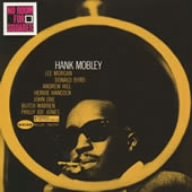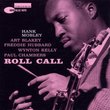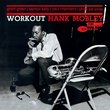| All Artists: Hank Mobley Title: No Room for Squares (24bt) Members Wishing: 4 Total Copies: 0 Label: Toshiba EMI Japan Release Date: 1/13/2008 Album Type: Original recording remastered, Import Genres: Jazz, Pop Style: Bebop Number of Discs: 1 SwapaCD Credits: 1 |
Search - Hank Mobley :: No Room for Squares (24bt)
 | Hank Mobley No Room for Squares (24bt) Genres: Jazz, Pop
Japanese Limited 24 Bit Mastered Version featuring an LP Style Slipcase for Initail Pressing. |
Larger Image |
CD DetailsSynopsis
Album Details Japanese Limited 24 Bit Mastered Version featuring an LP Style Slipcase for Initail Pressing. Similar CDs
|
CD ReviewsMore Mobley, One of the Kings of Tenor Tone Pharoah S. Wail | Inner Space | 02/04/2005 (5 out of 5 stars) "Like it says in the official review, most of this is album is Mobley, Morgan, Hill, Ore and Philly Joe, while 2 tracks are Mobley, Byrd, Hancock, Warren and Philly Joe. Whether or not I think of this album as highly as Soul Station comes down to nothing more than the mood I am in at the time. If I want All Mobley All the Time, then Soul Station is the big winner. If I'm in the mood for having the ball passed around to more players, this is the one. This may very well be my favorite playing I've ever heard by Lee Morgan. If you can listen to this album and sit still, you're a better (or maybe just unfortunate) person than I. Albums like this almost break your heart, when taken within the historical context of jazz. How is it that a tenor player can play like this and not be a household name... even within some corners of the jazz community?? You'd have a hard time convincing me that Mobley wasn't the singlemost underrated, and historically undervalued tenor player of the entire "classic jazz" era. The man was a musical giant, and on this album he put together yet another classic Blue Note. A straight-ahead, power-grooving bop masterpiece. This one is essential." Master of a universal language Samuel Chell | Kenosha,, WI United States | 11/15/2006 (5 out of 5 stars) "No improviser in my experience wears as well as Hank Mobley. Much as I love Stitt, the licks soon become overly familiar. And despite my reverence for Coltrane's genius or the Titanic power of a Dexter Gordon or Sonny Rollins, any of them can be a "heavy load" when played on a constant basis. But Mobley's unforced sound, so conversational, natural yet expressive, and his inexhaustible melodic vocabulary--thanks to his ability to react in the moment, availing himself of each serendiptious opportunity--make him a welcome companion for practically any occasion, and on a quotidian basis. I indiscriminately purchase anything by or with Mobley recorded between 1954 and 1962, no reservations needed. However, beginning with "No Room for Squares" and the sessions from 1963 onwards, a listener is best advised to exercise some caution. Mobley was being pressured--by Blue Note Records (Jimmy Smith and Stanley Turrentine were paying the bills for the studio) and by the trends of the sixties (whether Trane modal harmonics or heavy-duty funk)--to "modernize" his music (i.e. more modal tunes, more ad nauseum riff tunes on the order of "Sidewinder," deeper and more physical grooves) and as a result can be heard forcing his sound, simplifying his compositions, and gradually and very sadly self-destructing throughout the late '60's and into the '70's. Such transformations are just beginning to become noticeable with "No Room for Squares" which, happily, is still prime-time Mobley despite the more aggressive edge to his sound and a few attempts to disguise the overly familiar with "hopefully hip" melodic-harmonic choices. Listen to him handle the "I Got Rhythm Changes" for a full seven inspired choruses on the opening "Three-Way Split," showcased in the best possible light by Philly Joe's elegant hipness, and giving a harmonic "clinic" to Lee Morgan, who provides a spirited follow-up to Mobley's stellar inventions under the circumstances (slightly ragged and repetitious compared to Hank but rescuing his solo with an extemporaneous-sounding quote from "And the Angels Sing." With the opening "Rhythm" tune, plus an exquisite ballad, an infectious blues, and a driving modal melody on the title number, "No Room for Squares" is an album which, despite the somewhat exclusive and limiting, elitist-sounding title, deserves and is likely to satisfy the widest (discerning) audience possible." Mobley's Masterpiece: Hippest of the Hip Todd M. Stellhorn | baltimore, MD | 07/30/2007 (5 out of 5 stars) "At times I'm blown away by the likes of Coltrane, and Rollins, but as much as I like and admire those tenor giants nobody pulls me into their playing like Hank Mobley. "No Room for Squares" is classic blue note all the way. With the complimentary tandem of Lee Morgan and Hank Mobley (was there ever a tenor sax/ trumpet combination that fit as naturally as these two?), the always interesting work of Andrew Hill, the cool fire of Philly Joe Jones, and not to mention the hippest of all the hip-smokey-high-contrast-bohemian-tinted blue note album covers. Here we have a mature Mobley by turns stretching out and staying within the song, keeping the mood and the blue-funk fire forever burning slow. It would be impossible for me to pick one Mobley album as being the best (Soul Station, Roll Call, Work out, Dippin', Quartet, Caddy for Daddy, and the self titled album are all right up there in that rarified stratusphere), but this album captures the cool-toned essence of his playing as well as any of them. It's all there: the aforementioned warm tone, the intriguing interplay, the group unity that always seems to play to the group's strenghts, that always seems to keep things snare drum tight while at the same time exhibiting the relaxed telepathy of players who know how to communicate with each other and the song. You have to look hard to find bad Mobley on blue note (like two tracks on "reach out") but like Caesar's wife this album is above reproach. Give Mobley a chance and he'll change the way you hear the tenor. As for people who bemoan his underratedness and tragic fate I say that the man got to live his life doing what he wanted to do, and he left a legacy that will always live as long as people have the ears to hear it.
" |

 Track Listings (8) - Disc #1
Track Listings (8) - Disc #1
